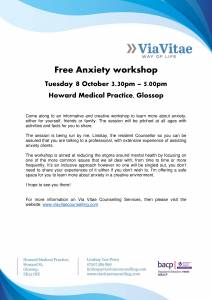Free Anxiety workshop 8 October 2019
Thanks to all the local business pages supporting the promotion of the workshops that I have been holding over the last two months. Your help and encouragement is much appreciated!

Today’s workshop is on anxiety, held at Howard Medical Practice 3.30pm- 5.00pm (see image for more details)
I’m offering a safe space for you to come and learn some facts about anxiety and mental health in general. It will be a creative approach with activities suitable for all ages. You will be able to take away worksheets that are suitable for all the family; this can help make mental health issues a more approachable subject if there is an element of fun about how you explore it, especially with children and adolescents.
What is anxiety?
DSM 5 definition of anxiety:
A. Excessive anxiety and worry (with apprehensive), occurring more days than not, for at least 6 months, about a number of events or activities (job, school, relationships etc).
B. The person finds it difficult to control the worry.
C. The anxiety and worry are associated with three or more of the following six symptoms (with at least some symptoms present for more days than not, for the past 6 months):
1. Restlessness, or on edge
2. Easily fatigued
3. Difficulty concentrating or mind blanks
4. Irritability
5. Muscle tension
6. Sleep disturbance (too much or too little)
D. The disturbance is not better explained by another mental disorder (e.g., anxiety or worries over other symptoms you might be experiencing, such as: making excessive negative evaluations, concerns over contamination or other obsessions, separation from attachment figures, panic over flashbacks or intrusive thoughts, a preoccupation with your weight, physical complaints, perceived appearance flaws, contracting a serious illness or delusional beliefs).
E. The anxiety, worry, or physical symptoms cause significant distress or impairment in key areas of functioning.
F. The disturbance is not the results of substance usage.
As a counsellor, it is not my job to diagnose a client with any illness or disorder, however I have a duty of care to know about these classifications and hold them in awareness. A key belief in person-centred counselling is that we treat the person not the disorder; therefore if having a label for what you are enduring is helpful to you, then we can work with that. If you find it unhelpful and diminishing in someway then we can look at the symptoms instead of the label. It is really about individual differences and how you best respond to talking about your problems and concerns over any mental health issue.
Anxiety is one of the more common mental health concerns that I help clients with on a weekly basis- I offer this information to demonstrate to you that you are not alone in your worries, and your worries are valid and important; they deserve to be heard and worked through.
If you believe you are experiencing prolonged anxiety symptoms and this is impairing your day to day life then you may benefit from seeing a counsellor.
Add Comment